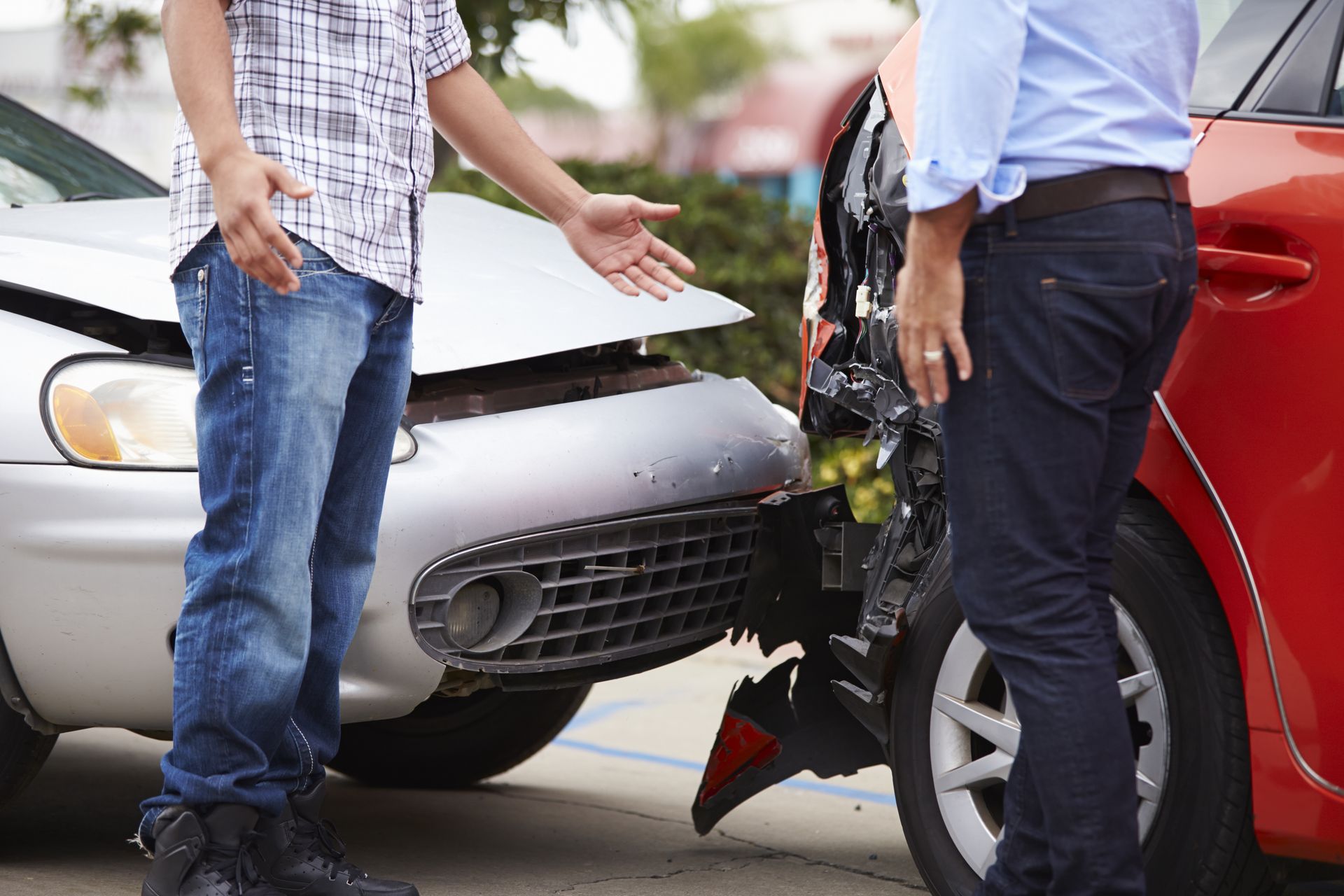By Joseph Zdrilich
•
April 25, 2025
If there's one thing we all hate, it's paperwork. Gathering documents and remembering minute details about an event isn't the strong suit of many. But when you're filing an accident claim in Atlanta, these skills are necessary, and the task is required to receive compensation that you desperately need. To help guide you through this process, accident injury attorneys use compassion and expertise so you can get the financial help you need to recover. Here are a few tips from the experts. Completing the Atlanta car accident insurance claims process can be overwhelming, especially when dealing with injuries and vehicle damage. This guide will outline essential steps to take after an accident, explain the types of insurance coverage available, and detail how to file a claim effectively. By understanding this process, readers will feel more empowered to seek fair compensation, alleviate stress, and make sure their rights are protected after a crash. Whether it's negotiating with insurance adjusters or calculating damages, this article will provide valuable information to help individuals make informed decisions during a challenging time. Overview of the Atlanta Car Accident Insurance Claims Process The process of completing an Atlanta car accident insurance claim begins with the filing of a claim to the driver’s insurance company. This step is crucial as it sets the foundation for potential compensation related to expenses such as medical bills and therapy costs that may arise due to injuries sustained in the accident. Details about the accident location, such as Peachtree Street, can be significant in determining liability. After the initial claim is filed, the insurance company will investigate the circumstances of the crash, including the speed limit in the area to assess compliance from involved drivers. Evidence from the scene, such as police reports and witness statements, supports the claim's validity. Understanding these factors can influence the outcome of the negotiation process regarding settlements. If the claim involves factors like unclear fault or significant medical expenses, legal assistance may be necessary. Attorneys who specialize in car accidents can provide guidance on how to handle complicated situations, including instances of assault or disputes arising from the accident. These professionals help victims to not settle for less than what they deserve. Finally, negotiations with the insurance company may lead to a proposed settlement. During this phase, it is vital to evaluate whether the offered compensation adequately covers all associated costs, including ongoing therapy related to injuries. Accepting the settlement is a significant decision that should consider future expenses and possible complications from the accident. Essential Steps After an Atlanta Car Accident After an Atlanta car accident, it is essential to take specific actions to protect one's rights and support potential claims. Reporting the accident to authorities is the first step, followed by gathering key information at the scene. Seeking immediate medical attention is crucial for health and documentation purposes. Collecting evidence, including witness statements and photos, will strengthen a claim, especially in cases involving construction zones or disputes on highways around metro Atlanta. Reporting the Accident to Authorities In the aftermath of car accidents in Atlanta, reporting the incident to the authorities is a critical first step. This formal report documents the event and establishes an official record, which can be essential for future evaluations of the claim. For victims involved in hit-and-run accidents, having a police report can significantly aid in the investigation and pursuit of compensation. Moreover, providing accurate details and cooperating with law enforcement serves to protect the rights of the individuals involved. It is advisable for those injured during the accident to seek immediate medical attention, as this documentation can be pivotal if they decide to consult a personal injury lawyer later. Properly reporting the accident not only enhances the chances of a successful claim but also guarantees all necessary evidence is gathered to support the case. Gathering Key Information at the Scene Gathering key information at the scene of a car accident is essential for building a strong accident claim. Victims should collect details such as the names and contact information of all parties involved, along with the insurance information. Photos of the accident scene, damages to vehicles, and any visible injuries can provide critical evidence that supports the claim and aids in potential negotiations with insurance companies. Additionally, securing witness statements can play a significant role in establishing liability. If a lawyer becomes involved, the gathered evidence will help them effectively follow the law, potentially leading to punitive damages if applicable. Promptly addressing these actions not only strengthens the claim but also makes sure the victims’ rights are well-protected moving forward. Seeking Medical Attention Immediately Seeking medical attention immediately after an Atlanta car accident is vital for a victim's health and well-being. Statistics indicate that prompt medical care can significantly affect recovery outcomes. In situations involving aggressive driving behaviors, such as tailgating or driving under the influence, injuries might not be immediately apparent, making it essential for individuals to undergo a thorough examination to identify any underlying conditions. Moreover, establishing a medical record early on supports the claims process by providing documentation that can be critical in negotiations with insurance companies. This communication between medical professionals and legal representatives can help reinforce the case, particularly when assessing potential settlements or verdicts in court. Prompt medical attention not only assures individuals receive necessary care but also strengthens their claims and they are adequately compensated for their injuries. Collecting Evidence for Your Claim Collecting evidence after accidents is vital for strengthening a claim related to car crashes in Midtown Atlanta. Victims should document damages to vehicles, any visible injuries, and the overall accident scene. This documentation enhances the validity of an insurance policy claim, as clear evidence can significantly influence negotiations and help establish fault, especially in cases that involve road rage or aggressive driving behaviors. Furthermore, securing witness statements can greatly support a claim by providing firsthand accounts of the incident. This evidence is crucial when addressing disputes with insurance companies regarding liability. Effective evidence collection not only bolsters the case for compensation but also helps victims pursue just compensation for their suffering and losses stemming from the accident. Understanding Types of Insurance Coverage in Atlanta Understanding the different types of insurance coverage available in Atlanta is essential for managing accident cases effectively. Liability coverage is crucial as it addresses damages caused to others, particularly in cases involving stop signs. Personal Injury Protection (PIP) plays a key role in covering medical expenses for injured parties, while Uninsured/Underinsured Motorist Coverage safeguards against risks posed by drivers without adequate insurance. Each of these coverage types is vital in managing the aftermath of accidents in areas like Buckhead. Liability Coverage Explained Liability coverage is fundamental in personal injury law, as it provides financial protection for damages caused by a driver to others, including pedestrians. This type of insurance helps victims, whether in vehicles or while crossing the street, receive compensation for their injuries and related expenses. In cases of a driver’s failure to adhere to traffic laws, such as ignoring stop signs, liability coverage becomes essential in the claims process. For those filing an accident claim, personal injury lawyers emphasize the importance of having adequate liability coverage. Stress can arise when dealing with medical bills and lost wages, especially if a driver is underinsured or lacks coverage altogether. Understanding liability limits helps victims anticipate potential shortfalls in compensation and strategize their next steps for recovery effectively. Personal Injury Protection (PIP) in Georgia Personal Injury Protection (PIP) insurance in Georgia is a vital aspect of coverage for victims of car accident cases. PIP provides financial assistance for medical expenses, including physical therapy, and lost wages, regardless of fault. This means that even if the other driver is not insured or is underinsured, individuals can still pursue compensation for necessary treatments and related losses through their own coverage, streamlining the claims process and reducing the burden during recovery. Understanding PIP is essential for individuals in the aftermath of a car accident. Georgia law sets a statute of limitations on filing personal injury lawsuits, which is typically two years from the date of the accident. Having PIP coverage can help cover immediate medical needs and preserve the right to seek further compensation if the expenses exceed policy limits or if a dispute arises with the liable party. This proactive approach gives victims the necessary support during their recovery journey. Uninsured/Underinsured Motorist Coverage Uninsured/Underinsured Motorist Coverage (UM/UIM) is essential in Atlanta as it protects individuals from drivers who lack adequate insurance. In cases involving serious accidents, such as truck accidents, where the at-fault party is uninsured or underinsured, this coverage allows victims to seek compensation for medical expenses, lost wages, and other related costs. For patients who may face long-term recovery needs, having UM/UIM coverage can significantly ease the financial burden during the claims process. This type of coverage becomes particularly relevant for victims dealing with premises liability claims or other issues related to accidents. If an injury occurs due to the negligence of a property owner, insurance may not cover all related costs, leaving victims vulnerable. By securing Uninsured/Underinsured Motorist Coverage, individuals can have the necessary financial support to complete their recovery and achieve a fair settlement for their damages. Filing an Insurance Claim After a Car Accident in Atlanta Promptly notifying the insurance company is vital after an accident, as it kickstarts the process of seeking financial compensation. Documentation is essential, including police reports and medical records, providing necessary evidence for the claim. Understanding how claim investigations work can help victims with potential challenges, particularly in cases involving distracted driving or other problems that may arise during the process. Common challenges in filing claims can include disagreements over liability or the extent of damages. Addressing these issues effectively helps victims overcome distress and focus on recovery, making clear communication and thorough documentation crucial during this time. How to Notify Your Insurance Company Notifying the insurance company after a car accident is a critical step in pursuing a personal injury claim. It is important for the plaintiff to contact their insurer as soon as possible, providing details such as the accident's location, the nature of the injuries, and any potential loss of consortium claims that may arise from the situation. Clear and prompt communication can ease the process, reducing feelings of fatigue that often accompany the aftermath of an accident. When reporting the incident, the plaintiff should be prepared to discuss factors such as comparative negligence, which may impact the claim. For example, if the other driver shares some responsibility for the accident, this information is essential. By offering a complete account of the events, the claimant can better support their case and improve the chances of receiving the appropriate compensation for their damages. What Documentation Is Required? Documenting a car accident case requires collecting various forms of evidence to support claims effectively. Essential documentation includes police reports that detail the accident's circumstances, medical records that showcase injuries, and any evidence indicating issues, such as drunk driving. Gathering this information not only assists in establishing liability but also helps demonstrate the extent of pain and suffering experienced by the injured party, as well as any potential loss of income attributed to the accident. Additionally, victims should consider obtaining witness statements and photographs of the accident scene, which can further validate their claims. Accurate documentation creates a strong foundation for negotiations with insurance companies regarding settlements. Addressing the need for thorough documentation helps record all aspects of a victim's experiences, including pain level and financial losses, be adequately represented in the claim process. Understanding Claim Investigations Understanding claim investigations after an Atlanta car accident is essential for victims seeking compensation. Insurance companies will evaluate various factors, including eyewitness testimony and police reports, to determine liability. For those injured, especially by a truck driver, the investigation's outcome can significantly affect their quality of life and future compensation options. During the investigation, adjusters will meticulously assess the circumstances surrounding the accident, focusing on evidence that may indicate fault. This process includes examining traffic laws and collecting all relevant documentation. Victims should be prepared to present precise details about the incident, as thorough investigations are vital in establishing the foundation for their claims against insurance companies. Common Challenges in Filing Claims Victims of motor vehicle accidents in Atlanta often face common challenges when filing insurance claims, particularly regarding determining fault and assessing damages. Factors such as traffic violations or hazardous conditions can complicate a claim, leading insurance companies to dispute liability. For those in this situation, consulting an Atlanta car accident lawyer can provide essential insights and strategies to effectively address these issues and secure necessary compensation. Another significant obstacle arises from the insurance adjusters' evaluations, which may downplay the seriousness of injuries or the extent of damages incurred. Victims might encounter difficulties in proving their case, especially when documentation is incomplete or unclear. Engaging with a knowledgeable attorney can help individuals gather the necessary evidence and make sure their rights are protected throughout the claims process, ultimately facilitating a more favorable outcome in their pursuit of fair compensation. Managing Negotiations With Insurance Adjusters Preparing for initial discussions with the insurance company is essential in a car accident claim. Understanding settlement offers helps victims evaluate compensation related to accident injuries and liability insurance. Recognizing common insurance tactics can empower individuals during negotiations, helping them advocate for their safety and secure the benefits they deserve. Each of these topics plays a crucial role in the overall claims process. Preparing for Initial Discussions Preparing for initial discussions with insurance adjusters after an Atlanta car accident is vital for maximizing compensation. It is essential for individuals to gather all relevant documentation, such as police reports by law enforcement and medical records, to illustrate the extent of injuries or loss of wage due to the incident. Understanding the basics of negligence and how it applies to their case will empower victims to effectively communicate their needs and assert their rights during negotiations. During these conversations, individuals should be clear about their expectations and any ongoing medical costs associated with their recovery. For example, if the accident involved death or severe injuries requiring emergency care, discussing long-term financial implications is crucial in demonstrating the need for adequate compensation. A thorough preparation helps victims present their case compellingly, enabling them to complete the claims process and work toward a fair settlement. Understanding Settlement Offers Understanding settlement offers after a car accident in Atlanta is crucial for victims who are dealing with aggressive driving incidents or traffic light violations. These offers from insurance companies typically reflect an assessment of property damage and medical expenses. Claimants should carefully evaluate whether the proposed amount adequately covers all costs, including future medical care, as well as any potential fees associated with claims processing. Victims should also be aware of the statute of limitations regarding personal injury claims in Georgia, which is generally two years from the accident date. This timeline emphasizes the importance of not rushing to accept a settlement without fully understanding its implications. Engaging with professionals experienced in negotiating settlements can significantly enhance the likelihood of receiving fair compensation that addresses both immediate and long-term needs stemming from the accident. Recognizing Insurance Tactics Insurance adjusters often employ various tactics to minimize payouts on car accident claims. They may question the credibility of witness statements or downplay the extent of injuries resulting from the accident, especially if there is a history of prior claims. Understanding these strategies can empower victims and help them prepare their cases more effectively so they receive the compensation they deserve. Another common tactic involves the delay of claims processing. Adjusters may request extensive documentation, citing the duty of care that the injured party must maintain in their claim. For individuals managing a Georgia car accident case, recognizing these tactics and responding promptly can enhance the chances of a favorable outcome and expedite the resolution process. Calculating Damages and Compensation in Your Claim Victims of a car accident in Atlanta can pursue various types of damages to seek compensation for their losses. This includes understanding how to document expenses related to medical bills, including brain injury treatments and other impacts on daily life. Estimating future expenses is also essential, as it helps insurance companies evaluate the overall claim against the policy's coverage. Each aspect is pivotal for a successful resolution. Types of Damages Available in Atlanta In Atlanta, victims of car accidents can seek compensation for their losses. Economic damages cover tangible costs such as medical bills resulting from accidents caused by drowsy driving, including treatments and therapies needed for recovery. Additionally, victims can also claim lost wages if injuries prevent them from working, making it crucial to gather all relevant documentation to support these claims when dealing with auto insurance companies. Non-economic damages, which address pain and suffering, can also be pursued in Atlanta car accident cases. These may include emotional distress and loss of enjoyment of life due to the accident, particularly if it involved reckless behaviors like failing to brake in time. If the case escalates to a trial, understanding the full scope of damages becomes essential so victims receive appropriate compensation for all aspects of their suffering, not just the visible costs associated with their injuries. How to Document Your Losses Documenting losses accurately is a vital step in the insurance claims process following a car accident in Atlanta. Victims should keep detailed records of all medical expenses, such as treatment costs, therapy sessions, and prescriptions related to their injuries. This documentation serves as critical evidence in a subsequent complaint or when presenting the case in court, as it directly correlates to the compensation sought for damages incurred. In addition to medical records, individuals should compile evidence that illustrates the impact of the accident on their daily lives. This can include receipts for out-of-pocket expenses, records of lost wages due to missed work, and any correspondence with paralegals or legal representatives. By creating a comprehensive file of documentation, victims enhance their ability to substantiate their claims, increasing the likelihood of a favorable settlement from the insurance company. Estimating Future Expenses Related to Injuries Estimating future expenses related to injuries from a car accident in Atlanta involves a thorough assessment of ongoing medical needs and recovery processes. For instance, victims suffering from burn injuries may require long-term therapy, including physical rehabilitation or counseling, which can significantly impact financial stability. Properly evaluating these future costs helps individuals receive adequate compensation to address not only current expenses but also those arising from the behavioral changes necessitated by their injuries. In addition to immediate medical treatment, identifying long-term implications is essential for a comprehensive claim. Factors such as the fault of the other driver can influence settlements, especially if their negligent behavior led to serious injuries. Understanding the relevant regulations and what expenses may arise can empower victims to present a solid case, so they are protected from future financial burdens related to their recovery journey. Timeline for the Atlanta Car Accident Insurance Claims Process The typical duration for processing insurance claims following a car accident in Atlanta greatly varies, influenced by factors such as the complexity of the case, severity of injuries, and involvement of the Georgia Department of Transportation. Timely filing is crucial as delays can impact outcomes, including potential jury involvement in severe injury cases or disfigurement claims. This section will examine processing timelines, common delays, and the critical nature of prompt actions in the claims process. Typical Duration of Claims Processing The typical duration of car accident insurance claims processing in Atlanta can vary significantly, often ranging from a few weeks to several months. Factors such as the complexity of the case, including the extent of injuries like neck injuries, can lengthen the timeline. Furthermore, if the accident involved ridesharing services, such as Lyft, additional layers of negotiation may come into play, complicating the process further. Factors That Can Delay Claims Several factors can delay the processing of car accident insurance claims in Atlanta. One significant reason includes the difficulty of the case, which often arises from disputed liability or the need for extensive medical documentation. When insurance companies require additional information or expert evaluations, this can prolong the timeline, leaving victims in uncertainty as they await resolution. Moreover, negotiations with insurance providers can introduce further delays. If claims adjusters question the credibility of the evidence or if disagreements arise over the extent of damages and injuries, it may take longer to reach a satisfactory agreement. Individuals should be prepared for potential setbacks and consider seeking legal counsel to mitigate delays and make sure their rights are protected throughout the claims journey. Understanding the Importance of Timeliness in Filing Claims Timeliness plays a crucial role in filing insurance claims after a car accident in Atlanta. Promptly notifying the insurance company not only initiates the process but also helps crucial evidence, such as medical records and police reports, remain fresh and relevant. Delaying the filing can lead to complications, including the risk of missing the statute of limitations, which generally allows two years for personal injury claims in Georgia. Insurance companies often expect prompt communication; delays can negatively impact claim evaluations. Victims who take immediate action can better advocate for their rights, securing the necessary compensation for medical expenses and lost wages. By understanding the significance of timely filing, individuals can effectively streamline their claims process and enhance their chances of a favorable outcome.




